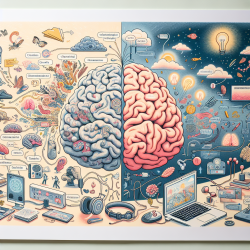Unlocking the Power of Music for Cognitive Longevity
As practitioners in the field of special education, we constantly seek ways to enhance our skills and provide the best support for our students. A fascinating study titled Recent and Past Musical Activity Predicts Cognitive Aging Variability: Direct Comparison with General Lifestyle Activities offers compelling insights into how musical training can be a powerful tool in promoting cognitive longevity.
Music and the Brain: A Harmonious Relationship
The study, conducted by Brenda Hanna-Pladdy and Byron Gajewski, explores the impact of musical training on cognitive aging. The researchers found that individuals with over ten years of musical training demonstrated superior cognitive abilities in areas such as phonemic fluency, verbal working memory, and visuospatial judgment compared to non-musicians. These findings suggest that musical training may lead to training-induced brain changes that enhance cognitive functions.
Key Findings and Implications for Practitioners
The research highlights several key findings:
- Musicians scored higher on tests of verbal and visuospatial abilities, suggesting that musical training enhances these cognitive domains.
- Early age of musical acquisition (before age 9) was linked to enhanced verbal working memory in later life.
- Recent musical engagement can offset the effects of lower education levels on cognitive performance.
These insights are invaluable for practitioners looking to integrate music into their educational strategies. Encouraging musical activities from a young age can help develop cognitive skills that benefit students throughout their lives.
Encouraging Further Exploration
While the study provides a strong foundation, it also opens the door for further research. Practitioners are encouraged to explore how different types of musical training and engagement levels can affect cognitive outcomes. Additionally, understanding the mechanisms behind these benefits can lead to more targeted interventions.
Practical Applications in Education
Integrating music into educational programs can be a fun and effective way to enhance cognitive development. Here are some practical steps practitioners can take:
- Incorporate musical activities into daily routines, such as singing, playing instruments, or listening to music.
- Encourage students to participate in music classes or join school bands and choirs.
- Use music as a tool to improve focus and memory retention during lessons.
Conclusion
The study by Hanna-Pladdy and Gajewski underscores the potential of musical training as a modifiable factor in cognitive aging. By embracing music as a part of educational strategies, practitioners can help students build a strong cognitive foundation that supports lifelong learning and development.
To read the original research paper, please follow this link: Recent and Past Musical Activity Predicts Cognitive Aging Variability: Direct Comparison with General Lifestyle Activities.










